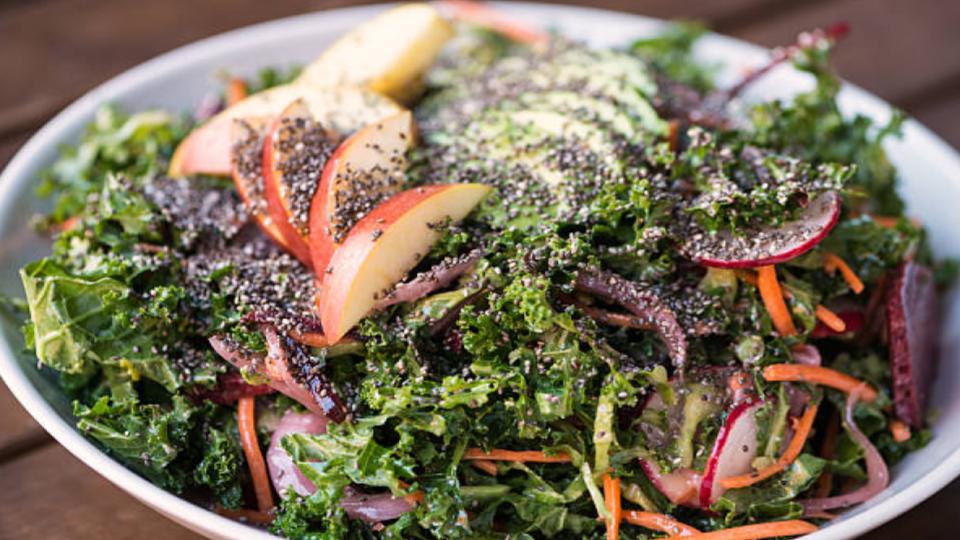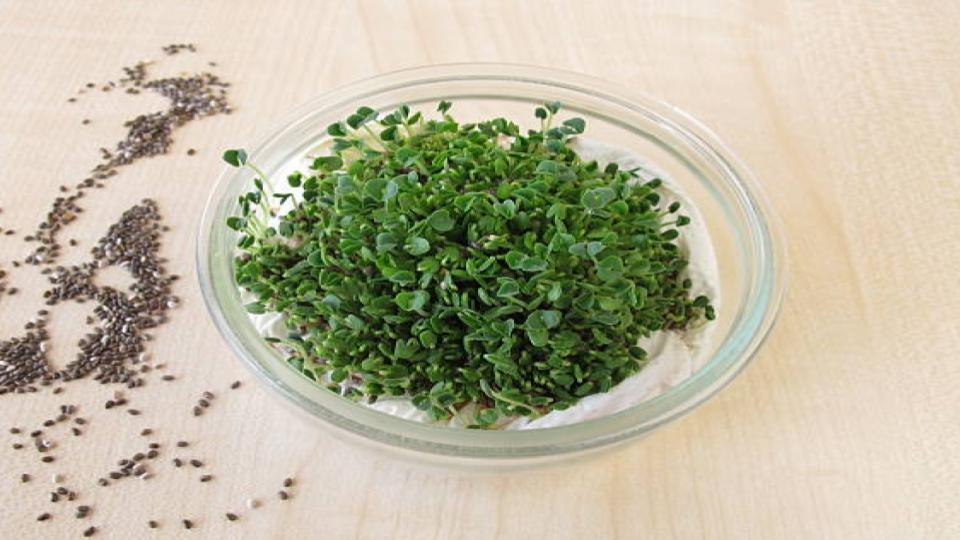How to Sprout Chia Seeds: Top Methods You Can Try

Table
of
Contents
Chia
seeds
have
been
one
of
the
ultimate
survival
foods
for
centuries.
The
ancient
Mesoamerican
Indian
and
the
Aztec
groups
considered
these
seeds
a
diet
staple
food.
Today,
they
are
often
added
to
nutritional
smoothies
and
drinks,
salads,
and
snacks.
But,
if
you
want
much
more
nutritional
benefits
from
these
seeds,
you
can
consume
the
Chia
sprouts
instead
of
the
seeds.
Interested
in
how
to
sprout
Chia
seeds?
I’ll
let
you
in
on
the
top
methods
you
can
try,
so
keep
reading…
The
Health
Benefits
of
Chia

Introducing
chia
into
your
diet
is
one
of
the
best
ways
you
can
take
in
a
lot
more
nutrients.
Most
people
think
of
fish
when
asked
about
a
protein-rich
meal
with
omega-3s.
But
did
you
know
that
chia
seeds
are
the
best
option
for
vegans?
Chia
seeds
are
the
most
affordable
source
of
omega-3
fatty
acids.
Here
are
just
some
of
the
health
benefits
of
chia
seeds:
-
Chia
seeds
can
prevent
blood
clots. -
It
will
raise
the
good
cholesterol
level
in
your
body
while
lowering
your
blood
pressure. -
It
can
reduce
inflammation. -
For
pregnant
women,
chia
seeds
can
help
develop
the
infant’s
brain
while
improving
their
nutritional
level. -
Decreases
the
likelihood
of
getting
adult-onset
diabetes.
Why
Should
I
Sprout
Chia
Seeds?

Despite
being
a
staple
food
for
some
cultures,
chia
seeds
have
a
callous
outer
layer
that
makes
it
hard
for
the
body
to
digest
them.
The
hard
outer
shell
also
inhibits
the
body’s
ability
to
absorb
nutrients
and
vitamins.
The
best
solution
for
this
problem
is
sprouting
the
chia
seeds.
Sprouting
the
seeds
can
help
break
down
their
tough
outer
layer.
This
will
make
it
possible
for
the
body
to
easily
absorb
the
nutrients
and
vitamins.
Sprouting
chia
seeds
help
our
bodies
access
the
fiber,
protein,
and
omega
3s
in
these
seeds.
Chia
sprouts
are
easier
to
digest,
and
they
have
more
nutrients
than
chia
seeds.
How
to
Sprout
Chia
Seeds
1.
The
Terra-Cotta
Tray
Method

Terra-cotta
is
a
unique
tray
made
using
either
brownish
or
brownish-orange
clay
and
then
hardened
into
any
shape.
Some
of
the
most
common
shapes
include
figures
of
animals
or
humans,
trays,
plates,
and
pots.
The
terra-cotta
has
a
porous
surface
that
wicks
water;
therefore,
making
sure
that
the
seeds
remain
moist
until
they
sprout.
The
main
difference
between
terra-cotta
and
clay
is
that
the
terra-cotta
is
already
modeled
and
fired.
On
the
other
hand,
clay
is
the
raw
material.
Terra-cotta
trays
can
be
made
using
a
wide
range
of
organic
clay.
The
terra-cotta
creates
an
excellent
airflow
that
protects
the
seeds
from
becoming
too
moist.
This
is
important
because
too
much
moisture
will
result
in
a
low-quality
sprout.
Here
are
the
steps
to
follow
to
sprout
the
chia
seeds
using
terra-cotta
trays:
-
Spread
the
right
amount
of
seeds
on
the
surface
of
the
terra
cotta
tray
or
dish. -
Pour
some
water
on
a
different
container
and
not
on
your
terra
cotta. -
Place
the
terra
cotta
on
the
surface
of
the
massive
container
with
water.
Make
sure
the
water
doesn’t
get
on
the
dish
containing
the
chia
seeds. -
Cover
the
two
dishes
to
prevent
the
water
from
evaporating. -
The
terra
cotta
tray
will
absorb
just
enough
water
to
keep
the
seeds
moist
until
they
sprout.
2.
The
Covered
Moisture
Method

The
covered
moisture
method
is
one
of
the
simplest
methods
for
sprouting
chia
seeds.
You
just
need
a
cover,
trays
or
aluminum
paper
plates,
and
some
water.
To
sprout
the
chia
seeds:
-
Start
by
cleaning
the
shallow
containers,
which
can
be
either
plastic
trays
or
aluminum
paper
plates. -
After
cleaning
it,
add
equal
portions
of
water
and
seeds
to
the
tray.
This
means
that
you
can
add
two
spoons
of
water
and
two
spoons
of
seeds. -
Let
the
seeds
sit
in
the
tray
for
about
an
hour
before
tilting
it
to
the
side
and
draining
the
tray. -
Once
the
seeds
have
become
moist,
you
can
cover
the
tray
and
let
the
seeds
sprout. -
Generally,
the
seeds
should
start
sprouting
after
four
days. -
After
the
sprouts
have
attained
a
height
of
about
0.25
inches,
you
can
expose
them
to
the
sun
and
let
the
leaves
turn
green.
3.
The
Chia
Pet
Technique
Chia
seeds
can
easily
germinate
when
placed
on
any
surface
that
allows
their
roots
to
grow
and
absorb
water.
Therefore,
you
can
sprout
the
seeds
on
any
porous
material,
including
clay,
paper,
cloth,
and
sponge.
For
this
method,
you
can
do
the
following:
-
Start
by
filling
a
tray,
plate,
or
small
dish
with
about
a
quarter
cup
of
water. -
Soak
your
planter
for
about
60
minutes
in
the
container
of
water. -
Moisten
the
seeds
for
about
60
minutes
and
then
pour
them
on
the
planter. -
Next,
spread
the
seeds
using
a
small
knife
or
spatula
of
the
terra-cotta
planter’s
grooves. -
Add
some
water
to
the
planter
to
prevent
it
from
drying
out.
The
seeds
will
start
sprouting
after
about
five
days. -
If
the
air
in
your
home
is
too
dry,
you
can
cover
the
planter
with
a
plastic
bag.
The
plastic
bag
will
help
keep
the
air
around
the
planter
moist,
so
the
seeds
will
sprout
faster. -
You
can
remove
the
plastic
bag
after
some
of
the
seeds
have
started
sprouting.
But
make
sure
to
protect
the
chia
sprouts
from
direct
sunlight.
4.
The
Wide-Mouth
Jar
Technique
The
simplest
and
most
effective
method
for
sprouting
seeds
is
a
wide-mouth
jar.
You
can
easily
cover
it
with
a
cheesecloth
cover
and
secure
it
using
a
rubber
band
with
a
suitable
jar.
The
cover
will
ensure
that
the
seeds
remain
moist
while
sprouting.
Here
are
the
steps
for
this
technique:
-
Add
about
four
spoons
of
seeds
in
your
wide-mouthed
jar -
Add
about
three
times
more
water
than
the
seeds
and
soak
them
for
about
12
hours -
Next,
drain
the
jar -
After
draining
the
water,
you
can
add
more
fresh
water
and
rinse
the
seeds. -
Drain
it
again
and
place
the
jar
away
from
direct
sunlight -
Make
sure
you
rinse
the
seeds
twice
a
day
for
a
week
or
until
they
sprout. -
After
the
sprouts
have
become
long
enough,
you
can
rinse
them
to
remove
the
seed
coats
and
seeds.
The
height
of
the
sprout
varies
with
preference,
so
it’s
up
to
you
to
decide
the
right
size.
Finally,
you
can
consume
them
raw
or
cook
them.
Before
storing
them,
make
sure
to
drain
them
well.
It
would
be
best
if
you
only
preserved
them
for
a
maximum
of
10
days.
5.
The
Spray
and
Tray
Method
Instead
of
wicking
water
through
the
terra-cotta
tray’s
surface,
this
method
will
require
you
to
spray
some
water
on
the
seeds.
The
first
thing
you
should
do
is
pour
some
chia
seeds
on
your
tray
or
dish.
After
placing
a
thin
layer
of
seeds,
you
can
spray
some
water
on
them
every
day.
You
can
spray
it
once
in
the
evening
and
once
when
you
wake
up.
You
can
expose
the
seeds
to
sunlight
indirectly
throughout
the
day.
If
you
do
everything
correctly,
the
seeds
will
sprout
within
seven
to
10
days.
To
ensure
that
you
don’t
have
to
spray
it
too
often,
you
can
cover
it
using
a
glass
or
plastic
cover.
Covering
the
chia
seeds
will
help
you
maintain
their
moisture
level
while
increasing
their
germination
rate.
6.
Paper
Towel
Method
Another
reliable
and
straightforward
sprouting
method
is
the
paper
towel
technique.
This
sprouting
method
will
require
you
to
use
some
simple
materials
like
a
dish,
some
water,
and
two
paper
towels.
All
you
have
to
do
is:
-
Fold
two
paper
towels
and
place
them
on
the
base
of
a
shallow
tray
or
dish. -
Pour
some
water
into
the
tray
until
the
towels
are
moist
enough. -
Pour
some
seeds
on
the
moistened
towels
and
keep
them
moist
by
adding
water. -
After
the
seeds
start
sprouting,
you
can
indirectly
expose
them
to
the
sun.
7.
The
Jiffy
Pot
Method
This
sprouting
method
will
require
you
to
use
a
3-inch
jiffy
pot
or
a
huge
one.
The
organic
pot’s
wood
or
peat
fibers
can
function
as
a
wick.
Therefore,
you
will
be
sure
that
the
seeds
will
remain
moist
during
the
entire
sprouting
stage.
To
sprout
the
seeds
using
a
jiffy
pot,
you
should
do
the
following:
-
Start
by
soaking
your
jiffy
pot
in
some
water. -
Pour
some
water
into
the
tray,
plate,
or
dish. -
Roll
the
jiffy
pots
on
the
seeds
until
they
are
fully
covered
with
the
seeds. -
Place
the
pot
on
the
dish
or
tray
containing
water
upside
down. -
Make
sure
you
keep
the
water
level
at
1
cm
by
replacing
the
evaporated
water
every
day.
The
seeds
should
start
sprouting
after
a
few
days.
Takeaway
Chia
seeds
are
highly
nutritious
superfoods,
but
digesting
these
seeds
can
be
pretty
challenging
because
of
their
tough
outer
layer.
It’s
beneficial
if
you
know
how
to
sprout
chia
seeds
to
remove
the
tough
outer
layer
of
the
seeds.
By
doing
so,
you
get
to
enjoy
all
the
nutritious
benefits
of
the
seeds.
Plus,
it’s
a
known
fact
that
sprouts
are
more
nutritious
than
fully
grown
plants.
